Contributors
More »- 1
- 2
- 3
- 4
- 5
- 6
- 7
- 8
- 9
- 10
- 11
- 12
- 13
- 14
- 15
- 16
- 17
- 18
- 19
- 20
- 21
- 22
- 23
- 24
- 25
- 26
- 27
- 28
- 29
- 30
- 31
- 32
- 33
- 34
- 35
- 36
- 37
- 38
- 39
- 40
- 41
- 42
- 43
- 44
- 45
Strategy? What Strategy?
04/04/2019
The Niti Aayog has unveiled its 41 Chapter ‘Strategy for New India @ 75.” I am baffled as to why such a document is produced so late in the lifetime of this government. Still, the intention is welcome; since the abolition of the Planning Commission, there has been no ...
The economic agenda for 2019
07/01/2019

The focus has to be on reforming public sector banks and on managing the fiscal situation, at the Centre as well as in states. There may not be any reforms until the elections are over. Hopefully, the year will see significant resolution of the bad loan problem and further improvements ...
Concerns with Delhi Metro
19/12/2018

(Coauthored with Ajay Shah)
The primary input that goes into an infrastructure project is money. In the case of the Delhi Metro, cost estimates run to Rs.5.52 Billion per km for the underground stretches and Rs.2 Billion per km for the over-ground stretches. The construction cost ...
When the estimate itself is questionable, should we be unduly concerned about slippages of one or two decimal points?
Over the years, the various “innovations” made to contain deficits have cast serious questions of credibility. While the credit rating agencies and economists rant about the slippage of a few ...

If the fastest and smartest path towards economic growth is to increase the female labour force participation, one policy which can bring radical change is “parental leave” policy for child care. Making eligibility to paid parental leave “gender neutral” is an urgent policy reform to eliminate the distorted debates in ...
